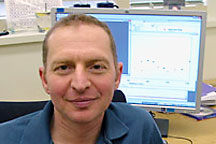Guest@MOF: Achieving Emergent Properties for Electronic and Energy Conversion Device Applications – Alec Talin, Sandia National Laboratories

Alec Talin, Distinguished Member of the Technical Staff, Materials Physics Department, MS9161, Sandia National Laboratories, California, P.O. Box 969, Livermore, CA 94551-0969, USA.
Metal-organic frameworks (MOFs) are extended, crystalline compounds consisting of metal ions interconnected by organic ligands, forming scaffolding-like structures that are sometimes referred to as “molecular tinker toys”. MOFs have attracted considerable attention for traditional applications of microporous materials, such as gas storage and separation. In many of these cases, however, the interactions between the guest molecules (CO2, H2, etc.) and the framework are weak and do not constitute a chemical bond. In my talk I will discuss a rather different concept of Guest@MOF, one in which the interaction between the framework and the guest goes beyond the relatively weak physisorption and results in a new material with unique properties stemming from the strong MOF-guest interactions. The idea of Guest@MOFs emerging as a new class of materials was stimulated by our discovery that infiltrating HKUST-1 pores with TCNQ (an insulator in its pure state) increases the electrical conductivity of the insulating MOF by over seven orders of magnitude (from <10-8 S cm-1 to ~ 0.1 S cm-1) [1]. This emergent property results from a donor-bridge-acceptor geometry, in which TCNQ binds to two Cu(II) dimer units within the MOF pore. I will describe the synthesis, chemical, and electrical characterization of TCNQ@ HKUST-1, as well as first-principles electronic structure calculations that indicate that conductivity occurs via a hopping mechanism facilitated by the bridging TCNQ. I will also discuss recent thermoelectric measurements which suggest that Guest@MOF materials may be useful in waste heat recovery applications [2].
- A. A. Talin, A. Centrone, A. Ford, M. E. Foster, V. Stavila, P. Haney, R. A. Kinney, V. Szalai, F. El Gabaly, H. P. Yoon, F. Léonard, M. D. Allendorf, “Tunable Electrical Conductivity in Metal-Organic Framework Thin Film Devices”, Science 343, 66 (2014).
- K. J. Erickson, F. Léonard, V. Stavila, M. E. Foster, C. D. Spataru, R. E. Jones , B. M. Foley, P. E. Hopkins, M. D. Allendorf, and A. A. Talin, “Thin Film Thermoelectric Metal–Organic Framework with High Seebeck Coefficient and Low Thermal Conductivity”, Adv. Mat. 27, 3453 (2015).
BIO:
Site web du groupe de Dr Talin
Alec Talin is a Distinguished Member of Technical Staff at Sandia National Laboratories, in Livermore, CA, an adjunct associate professor of Materials Science and Engineering at the University of Maryland, College Park, and a Principal Founding Editor of MRS Communications. He received a B.A. in Chemistry from UC San Diego in 1989 and a Ph.D. in Materials Science and Engineering from UC Los Angeles in 1995. Prior to joining Sandia in 2002, Dr. Talin spent six years as a research scientist and manager at the Motorola Corporate Labs in Phoenix, AZ, and was a Project Leader at the Center for Nanoscale Science and Technology at NIST from 2009 to 2012. Currently, Dr. Talin leads a number of projects at Sandia in areas that include novel electronic materials, energy storage and conversion, and national security.
Cette conférence est présentée par le RQMP Versant Nord du Département de physique de l'Université de Montréal et le Département de génie physique de Polytechnique Montréal.
Emplacement : 5155, chemin de la rampe 1035 Montréal H3T 2B2 QC Canada